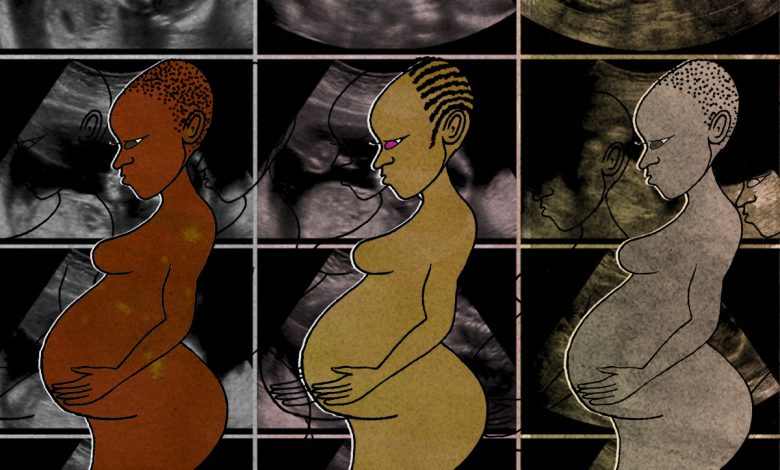
Learning the African history of caesarean sections will help us better challenge stigma
Illustration by Tessie Orange-Turner
As an undergraduate in medical school, I attended a charity event that focused on encouraging communities to address the stigma surrounding Female Genital Mutilation (FGM). Wandering over to a table of drinks after the panel discussion, I started speaking to a woman in her forties on her experiences of pregnancy and childbirth. She had migrated from Sierra Leone in her early twenties where she had undergone FGM as a child; she remembered very little of the actual procedure and was not aware she had been “cut” until she was pregnant and a midwife told her.
Her labour did not progress easily and she delivered her first child by emergency caesarean section. Whilst she was happy her baby was delivered safely, she was incredibly upset that she had to undergo a caesarean section – because a vaginal delivery was “the right way to deliver, the African way” and delivering through an operation made her feel like a failure. Up until this conversation, I had thought very little about childbirth and even less of the stigma associated with undergoing caesarean sections in some communities.
I held on to the memory but thought little of the conversation until recently. The findings of the 2019 MBRACE-UK report highlighted that Black women in the United Kingdom are five times more likely to die during pregnancy and in the six weeks following delivery than their white counterparts. Asian mothers are twice as likely to die than their white counterparts. The disparities in statistics for Black mothers in the UK are more similar to those in Egypt; despite the UK spending greater than 35 times that per head on healthcare.
“Black British people have told me that their mothers and grandmothers have expressed ‘disappointment’ when they had a caesarean section”
Over the last few months, I have spoken to many people on their experiences of childbirth and there is a recurring theme that a vaginal delivery equals a proper delivery; a caesarean section does not. Often, I hear Black African women express the idea that enduring a painful delivery is an essential part of motherhood and more recently, Black British people have told me that their mothers and grandmothers have expressed “disappointment” when they had a caesarean section.
But why is there still a stigma attached to childbirth by caesarean section? Why do some think that experiencing pain has always been an accepted part of childbirth?
The history of the caesarean section is not well understood and even the etymology is unclear – it either derives from the Latin word caedre, meaning to “cut out”, or after the Roman emperor, Julius Caesar, who is thought to have been surgically delivered. The first successful caesarean section is thought to have been performed in 1610, however it was not widely practiced, as few had acquired the skill and many continued to die undergoing the procedure.
It would appear that a false dichotomy has been created where those of white European ancestry are seen as traditionally birthing with the help of modern medicine and the aid of medical interventions, while those from the Global South birth using traditional healers and persevere through vaginal deliveries. However, the history of childbirth and how modern obstetrics came to be is far more complicated than that.
While traditional midwives were often women and their role was increasingly eradicated by the expanding role of doctors who were men, the first caesarean section to be performed where both mother and child survived was actually performed by James Miranda Stuart (who some have argued was actually a trans man – most of their colleagues only becoming aware of their gender after their death). At the time women were not allowed to study medicine or perform caesarean sections so James Miranda did so in disguise while acting as a physician in the British army in South Africa.
At a similar time, European colonisers were documenting their encounters with indigenous populations living across sub-Saharan Africa. Whilst most of these accounts are often deliberately prejudiced to justify white superiority and show indigenous populations as “savages”, they provide some insight into cultures and procedures that existed prior to colonisation.
For example, in 1879 British “explorer” R.W. Felkin witnessed a caesarean section in Uganda. He described “the operator” using banana wine to anaesthetise the women, sterilise their hands and the patient’s abdomen prior to surgery. The “operator” then made a midline incision and used heat to prevent bleeding. Rather than use sutures to stitch up the uterus they massaged the uterus to make it contract and the abdominal wound was pinned with iron needles. Felkin highlighted that many of the patients recovered well and that this technique had clearly been well refined over many, many years. Similar reports came from Rwanda, where botanical preparations were used to provide pain relief and promote wound healing. Today, like many sub-Saharan African countries, Uganda has one of the worst maternal mortality rates in the world but this is due to a complex web of factors, including how we sustain health systems.
“In 1879, British ‘explorer’ R.W. Felkin witnessed a caesarean section in Uganda. He described the use of banana wine to anaesthetise the women and for sterilisation”
As I have sought to understand how we have arrived at such striking disparities in the UK in terms of maternal mortality, I’ve encountered disgraceful bigotry, with some white people asking why we don’t return to where we came from if statistics here are so bad and others suggesting that it’s only thanks to Western medicine that more of us weren’t dying anyway. Yes, the maternity statistics in some countries in the Global South are bad, but this is in part because the skills of traditional birth attendants have rapidly been wiped out through colonial processes.
Imperialism continues to be a key reason why health systems in poorer parts of the world fail to function effectively. Recently, we have seen that 60% of NHS staff who died from Covid-19 were non-white and predominantly born abroad. If anything, it would appear that Britain requires our health labour to survive and not the other way around. While UK patients get to enjoy the medical skills of diaspora communities that migrate, it is important that we remember that some communities are also left devoid of skilled health care professionals. The UK’s stats are better in part due to the “brain drain” (where skilled workers from less well-resourced countries move to more well-resourced countries to system their economy).
These well-demarcated lines between what is considered white European medicine and what African medicine was and is will never be straightforward. Yet, the reasons as to why women in the Global North get a caesarean section when required and live when mostly Black and brown women in the Global South (or even in the UK) do not and die is one which must start to be universally acknowledged.











































